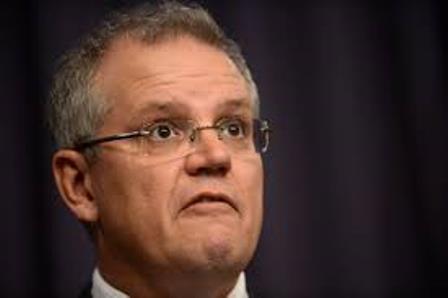Treasurer, Scott Morrison.
The Australian screen and arts community have been "shortchanged" in the 2016 Federal Budget with no extra funding for the arts and cuts to ABC news funding.
However the television industry is "cautiously optimistic" about cuts to spectrum licensing fees revealed in last night's budget announcement.
While base funding of the ABC has been maintained, funding for specialist news services will be cut by cut by $18.6 million over the next three years, putting further pressure on already undermanned staff and raising the prospect of cuts to its regional news operations.
Media Entertainment and Arts Alliance chief executive, Paul Murphy, said the new triennial funding agreement was a disappointment.
“The ABC’s base funding may be untouched, but of course the true damage to the corporation was done in 2014 and 2015, where about $250 million was cut,” he said.
“None of that money has been restored, while the special funding allocated to expand news gathering services – like the national reporting team, regional bureaus and the Fact Check unit – has been cut and news services will be placed under extreme pressure.”
Murphy said ABC staff had delivered considerable improvements in productivity and efficiency in recent years.
“The cuts to the ABC have had a significant impact on its staff and operations.
“About 400 jobs have been lost, including many prominent journalists, the popular state-based 7.30 programs have been axed, television production in Adelaide has been terminated, offices in some regional centres have been closed, and most recently, there have been changes to regional radio programming.”
MEAA is disturbed that the Prime Minister, Malcolm Turnbull and Minister for the Arts, Mitch Fifield have maintained the doomed course charted by their predecessors in the 2015-16 federal budget, which slashed $105 million from the Australia Council (since partly restored) and $40 million from Screen Australia.
“This is disappointing budget for our sector,” Mr Murphy said.
“The hopes that a new and more thoughtful approach to the arts would be embraced by Turnbull and Fifield has all but evaporated.
“The $10 million from the new Catalyst fund in no way makes up for the cuts to the Australia Council.
“The arts community is the place where we know the adage, ‘from little things big things grow’, is absolutely true.
"The lack of funding and incentive for talented young people hoping for a break means the well of Australian talent will be far drier than it ought to be.
“We can now only hope that a federal election will act as a circuit breaker and that the open hostility demonstrated towards arts funding is reversed,” Mr Murphy said.
Screen Producers Australia chief executive, Matthew Deaner, has also expressed ongoing concerns that the Federal Government has not sufficiently addressed cuts in consecutive budget-cycles.
He maintains this has resulted in less support for the sector by public broadcasters and cuts in screen support programs from Screen Australia.
“Earlier this week, Screen Producers Australia and other industry partners released our joint policy priorities," Deaner said.
"In it we call on Government and all major parties to ensure secure, sufficient and transparent funding for ABC, SBS and Screen Australia.
"Furthermore, we call for ambitious and deliverable policies to address the lack of competitive tax offsets as well as obligations for Netflix and other SVOD platforms that will be critical to our industry’s ongoing health and success.
Deaner said the budget did not address a very concerning trend of cuts that had occurred over the last couple of years.
"Screen Producers Australia also notes the announced cuts in spectrum licence fees to commercial free-to-air broadcasters and are cautiously optimistic that this will strengthen the television sector given their role in underwriting the production of local content," he said.
“In the past Screen Producers Australia has been supportive of a reduction in spectrum licence fees so long as these are balanced by content obligations and a commensurate increase in the level of expenditure on local production.
"In particular, commercial free-to-air’s investment in drama, documentary and children’s production is around $160 million annually, less than half that spent by these broadcasters on sports.
“From anti-siphoning to sub-quota obligations, there has historically been a delicate balance of Government regulation and interventions to ensure that commercial free-to-air investments in local production are wide ranging, across low cost per hour genres like news and current affairs to higher cost content like documentaries and drama. Diversity of programming is an obligation they must continue to carry."
Along with permanent increases to the tax incentives that encourage local and offshore film and television production, the joint production sector’s policy agenda specifically includes the extension of Australian content minimums to new platforms, such as online streaming services.
“In a challenging advertising market and with increased pressure, it is understandable that the industry will need to reflect on the regulatory regime going forward and to consider in what areas there may need to be more flexibility," Deaner said.
"However, this must be done with caution so as not to upset the careful balance that has ensured that there has been significant investment in local content by commercial free-to-air and great Australian stories to be enjoyed by Australian audiences.
"The industry has been waiting since reviews in 2011 for meaningful reform in the regulatory space affecting production.
"We anticipate that this will occur in the coming year and when it does we expect to see measures taken to offset tonight’s cuts in spectrum licence fees."


